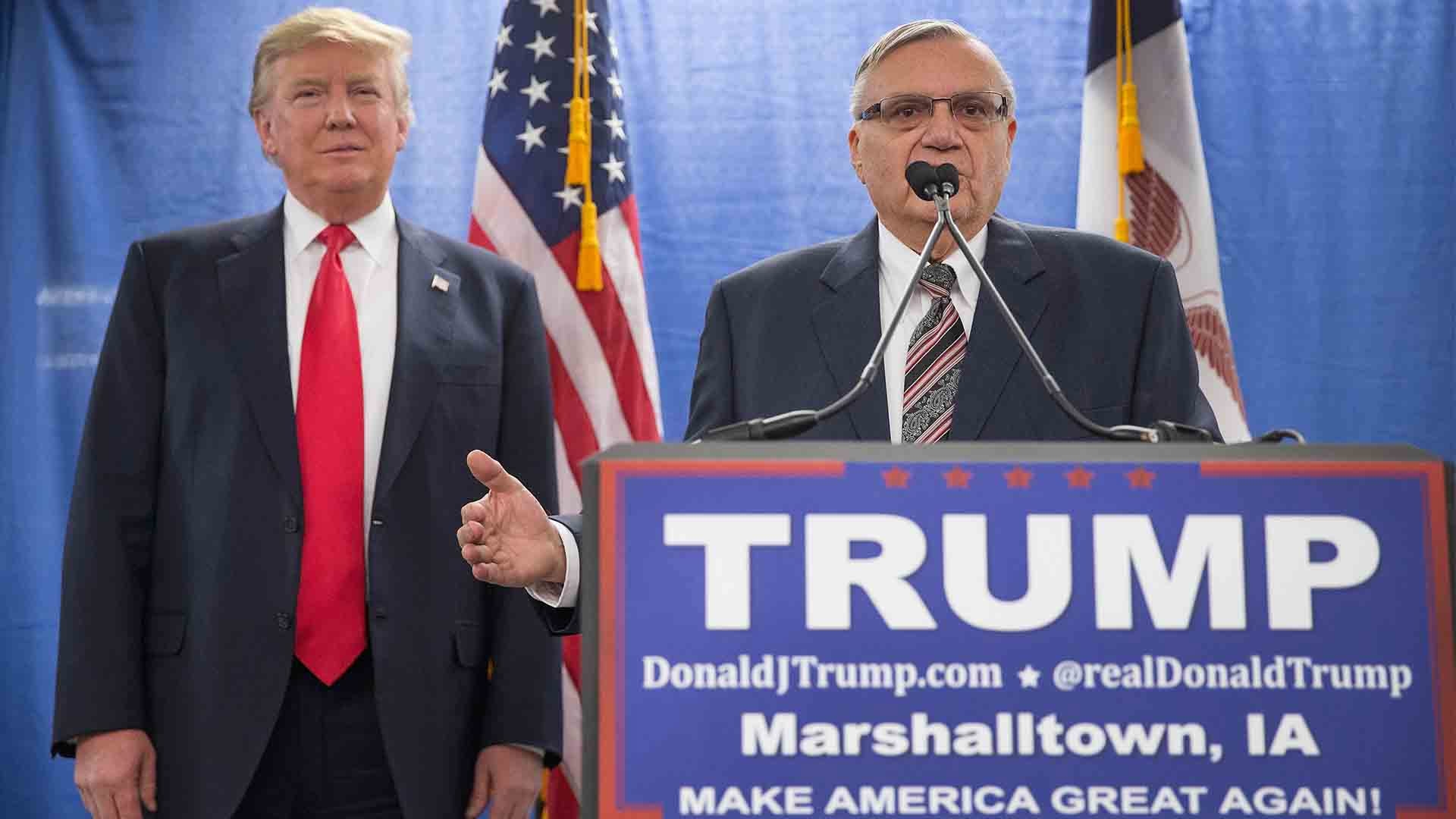US President Donald Trump has issued a mid-term pardon to divisive former Arizona Sheriff Joe Arpaio, in an intensely political – and controversial – decision touching on immigration policy, lingering tensions with the Obama administration, and the wider issue of using executive power to commute a sentence.
The 85-year-old lawman who dubbed himself "America's toughest sheriff" courted controversy with his targeting of Hispanic immigrants, and was found guilty of criminal contempt in July in a case involving racial profiling.

President Trump announced the pardon on Twitter
President Trump announced the pardon on Twitter
"Throughout his time as sheriff, Arpaio continued his life's work of protecting the public from the scourges of crime and illegal immigration," the White House said in a statement. "Sheriff Joe Arpaio is now eighty-five years old, and after more than fifty years of admirable service to our nation, he is a worthy candidate for a presidential pardon."

Joe Arpaio tweeted his thanks to Trump
Joe Arpaio tweeted his thanks to Trump
Arpaio condemned the case against him as "a political witch hunt by holdovers in the Obama justice department" on a website asking for donations to pay his legal fees.
Who is Joe Arpaio?
Arpaio gained a national profile for a severe crackdown on undocumented immigrants, and investigating the claims that helped launch Donald Trump's political career: questioning former President Barack Obama's citizenship.
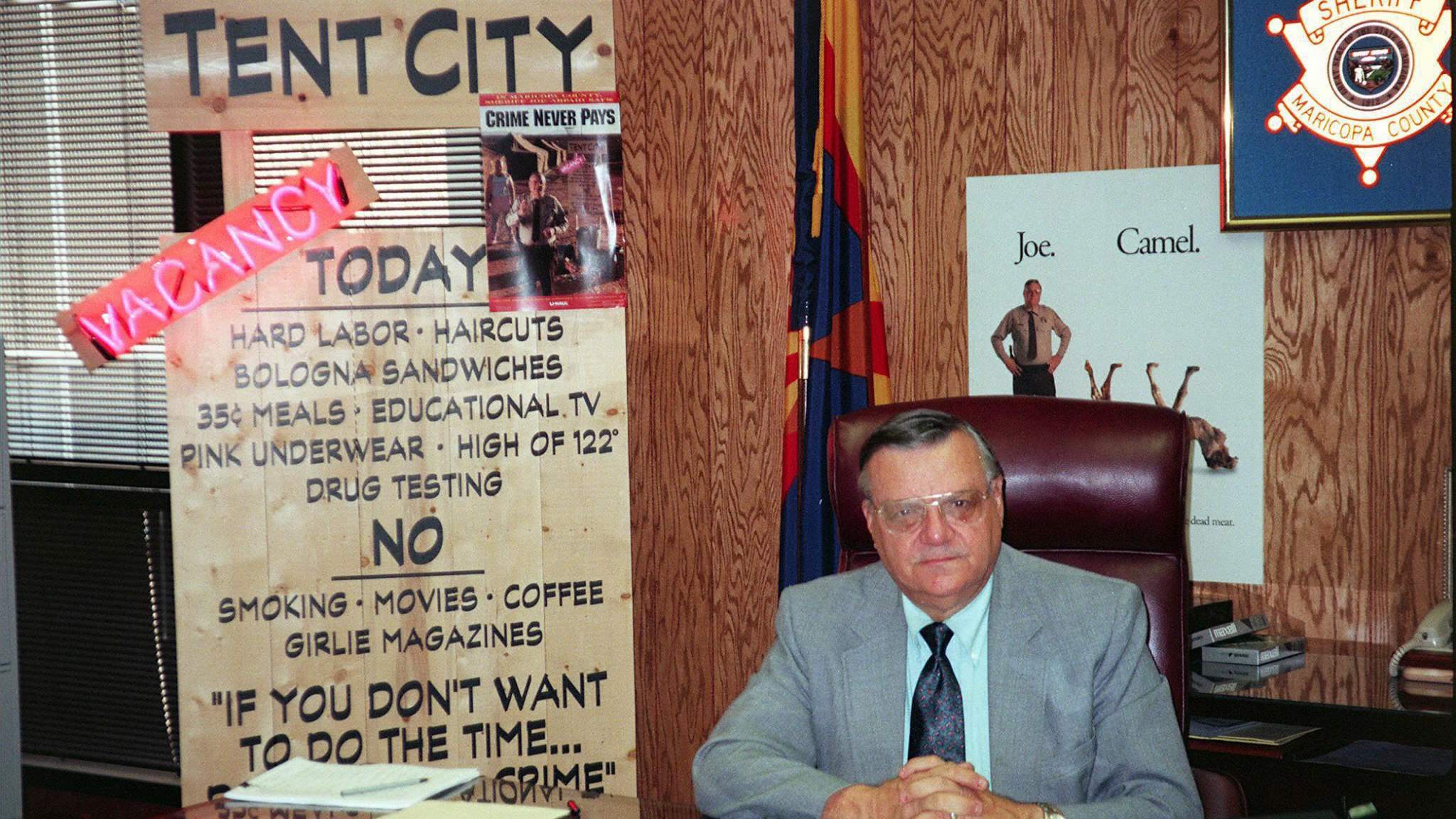
Maricopa County Sheriff Joe Arpaio sits behind his desk next to a sign for the "tent city" prison camp. /AFP Photo
Maricopa County Sheriff Joe Arpaio sits behind his desk next to a sign for the "tent city" prison camp. /AFP Photo
He was cheered and condemned in equal measure for his roundups of suspected illegal immigrants and his stewardship of the Maricopa County "tent city" jail. He reinstated chain gangs, made inmates wear pink underwear and old-fashioned black and white striped uniforms, and forbade them coffee, salt and pepper.
He was a vocal and early supporter of the Trump presidential campaign.
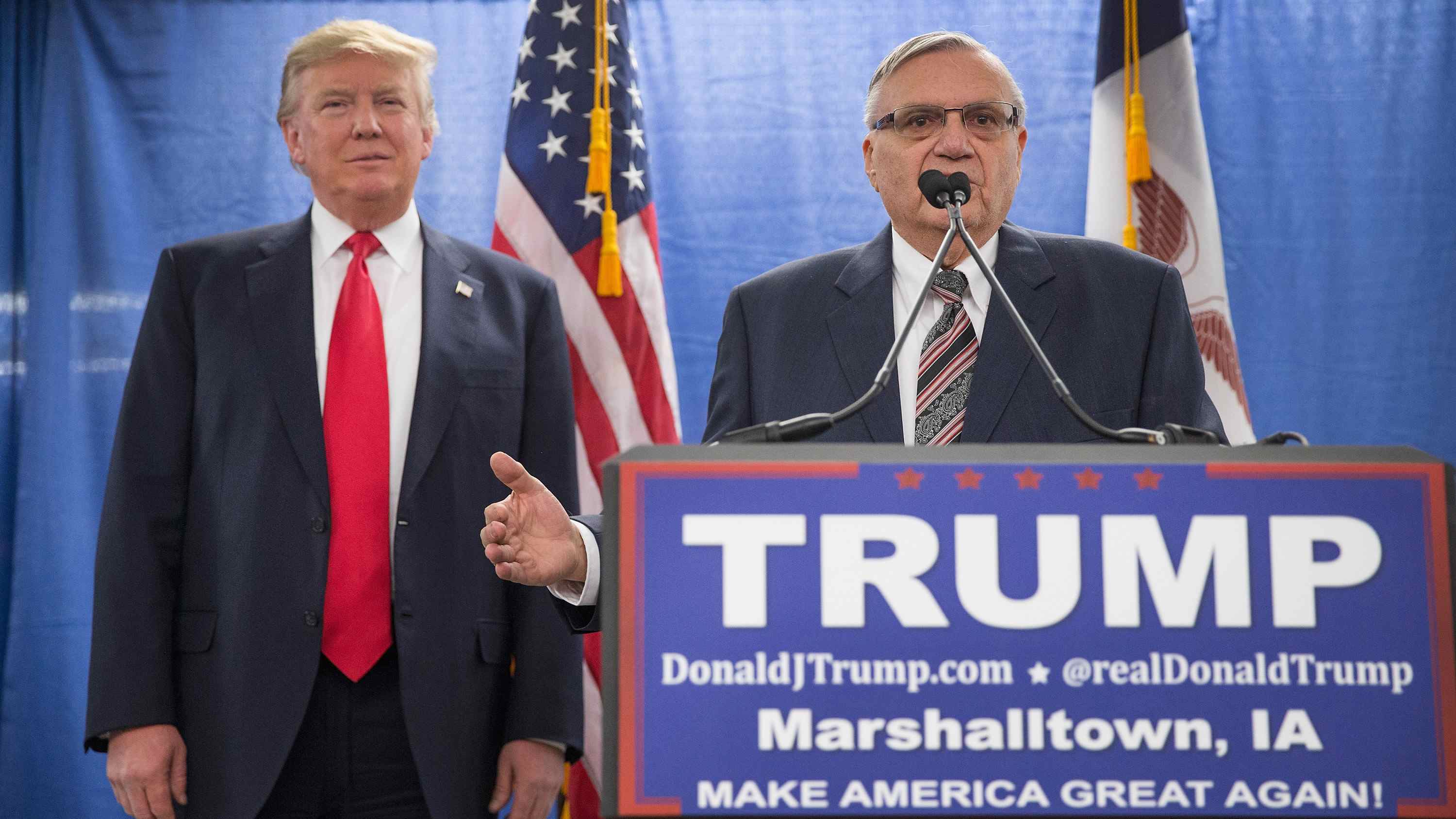
Sheriff Joe Arpaio (R) endorsing Republican presidential candidate Donald Trump prior to a rally in Marshalltown, Iowa on January 26, 2016. /AFP Photo
Sheriff Joe Arpaio (R) endorsing Republican presidential candidate Donald Trump prior to a rally in Marshalltown, Iowa on January 26, 2016. /AFP Photo
Arpaio was convicted on July 31 for willfully violating a 2011 injunction barring his officers from stopping and detaining Latino motorists solely on suspicion that they were in the country illegally.
He faced a fine and maximum sentence of six months in jail, had Trump not intervened.
Trump and immigration
Immigration-related issues were central to the Trump campaign and have been at the forefront of his presidency.
The decision to pardon Arpaio adds to concerns of civil liberties groups over the direction in which Trump is taking immigration policy, and led to immediate condemnation.
"With his pardon of Arpaio, Trump has chosen lawlessness over justice, division over unity, hurt over healing," said the American Civil Liberties Union's deputy legal director Cecilia Wang.
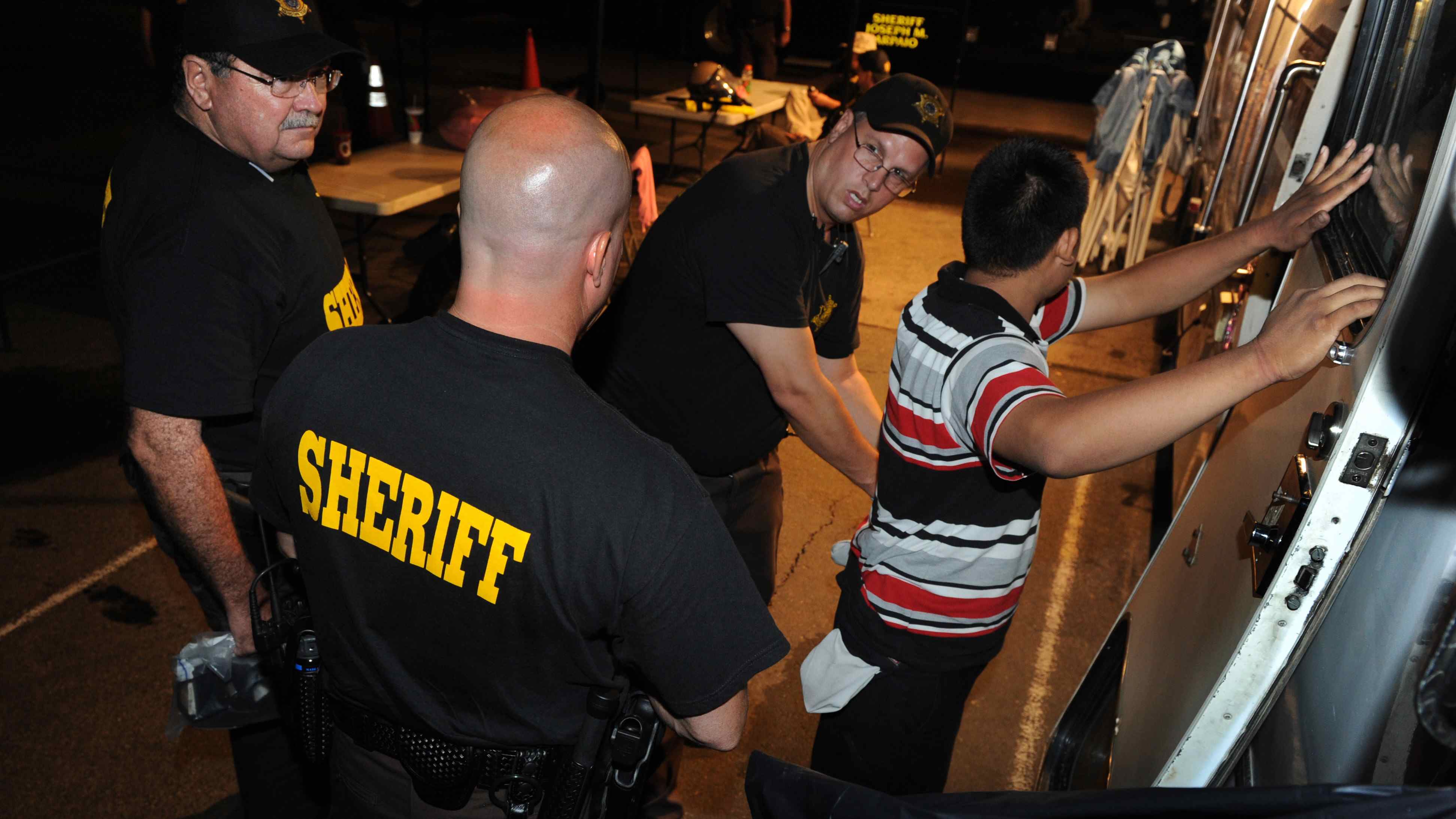
An illegal immigrant is processed by deputies working for Maricopa County sheriff Joe Arpaio, after an operational sweep in Phoenix on July 29, 2010. /AFP Photo
An illegal immigrant is processed by deputies working for Maricopa County sheriff Joe Arpaio, after an operational sweep in Phoenix on July 29, 2010. /AFP Photo
"Once again, the president has acted in support of illegal, failed immigration enforcement practices that target people of color and have been struck down by the courts. His pardon of Arpaio is a presidential endorsement of racism."
In the past week Trump has
threatened to shut down the government if funding isn't provided for a border wall with Mexico, while his administration is expected to issue visa sanctions on four countries "recalcitrant" about accepting citizens deported from the US.
The presidential pardon
The pardon had been signaled by Trump in a speech in Arizona this week, when he claimed Arpaio had been convicted for "doing his job."
"You know what, I'll make a prediction: I think he's going to be just fine," Trump told a cheering crowd. "I won't do it tonight because I don't want to cause any controversy. But Sheriff Joe should feel good."
US presidents are granted the power to bestow pardons in the constitution, but the practice – particularly when applied to individuals – has often proved controversial.
President Gerald Ford pardoned his predecessor, Richard Nixon, for crimes committed during his presidential term, meaning the disgraced Nixon did not have to stand trial.
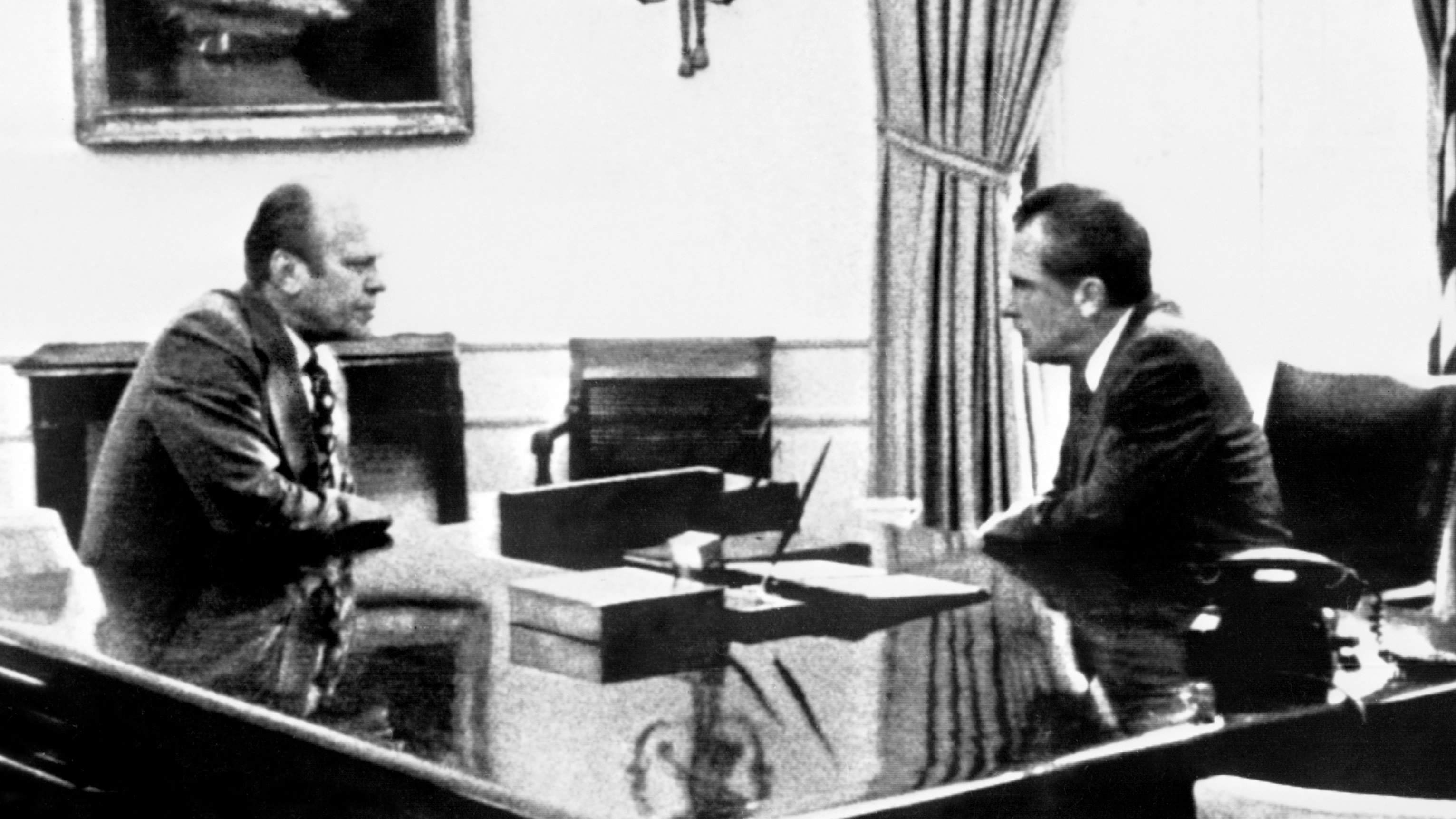
US President Richard Nixon talks to Gerald Ford in the Oval Office at the White House, Washington, DC, United States, on August 9, 1974 about the transition of power prior to Nixon's resignation after the Watergate scandal. Ford later pardoned Nixon. /AFP Photo
US President Richard Nixon talks to Gerald Ford in the Oval Office at the White House, Washington, DC, United States, on August 9, 1974 about the transition of power prior to Nixon's resignation after the Watergate scandal. Ford later pardoned Nixon. /AFP Photo
Bill Clinton issued 140 pardons on his final day in office – including to Marc Rich, a financier whose wife had donated to the Clinton library – while Jimmy Carter issued a blanket pardon to any American who avoided the draft for the US-Vietnam war.
The Washington Post has reported that Trump has considered pardoning family members, staff – and even himself – for connections to the Russia investigation.
Conservative commentator Bill Kristol suggested the Arpaio pardon "gets people used" to
the idea of presidential pardons as the Russia investigation deepens.
Source(s): AFP
,Reuters

